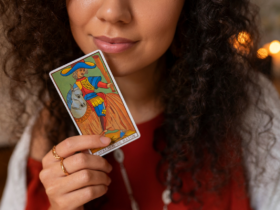For centuries, humans have looked to the Moon as a powerful force influencing nature and emotions. Astrology suggests that the Moon’s phases play a significant role in shaping our moods, energy levels, and overall well-being. While some dismiss it as superstition, others strongly believe that lunar cycles subtly but consistently affect human behavior.
How the Moon’s Phases Affect Mood
The Moon transitions through eight distinct phases, but the most significant emotional shifts are often associated with four key stages:
-
New Moon (A Time for New Beginnings)
The New Moon marks the start of a new lunar cycle, representing renewal, introspection, and fresh starts. During this phase, people may feel more introverted, reflective, or even emotionally drained. It’s an ideal time for setting intentions and planning for the future. Some individuals report feeling low energy or a desire to withdraw from social activities during this time. -
Waxing Moon (Building Energy and Momentum)
As the Moon begins to grow, energy levels rise. This phase is linked to motivation, creativity, and action. People often feel more ambitious and driven to accomplish goals. However, this increased energy can also bring about anxiety or impatience as anticipation builds. -
Full Moon (Heightened Emotions and Intensity)
The Full Moon is perhaps the most well-known for its emotional impact. Many claim that it amplifies feelings, leading to heightened passion, excitement, or even agitation. Some people experience restlessness, trouble sleeping, or stronger mood swings during this phase. There are also beliefs that the Full Moon influences human behavior, with some studies suggesting a correlation between lunar cycles and increased incidents of emotional outbursts, hospital visits, and even crime rates. -
Waning Moon (Release and Letting Go)
As the Moon begins to wane, emotions start to settle. This is a time for reflection, closure, and relaxation. People may feel a natural urge to declutter their lives, both emotionally and physically. It’s an ideal period for self-care, letting go of negative energy, and preparing for the next cycle.

Astrology and the Moon’s Personal Influence
Beyond the general lunar effects, astrology suggests that the impact of the Moon varies based on an individual’s birth chart. The Moon sign—determined by the Moon’s position at the time of birth—governs emotions, intuition, and inner needs. For example:
- Water signs (Cancer, Scorpio, Pisces) may feel the Moon’s effects more intensely, experiencing deep emotional shifts.
- Fire signs (Aries, Leo, Sagittarius) might notice increased impulsivity and bursts of energy.
- Earth signs (Taurus, Virgo, Capricorn) tend to experience more grounded emotional responses.
- Air signs (Gemini, Libra, Aquarius) may feel a mental or communicative shift rather than a direct emotional response.
Science vs. Belief
While there is no definitive scientific proof linking the Moon to mood swings, studies suggest that lunar cycles may have subtle effects on sleep, hormone levels, and even human behavior. The power of belief also plays a role—when people expect to feel a certain way during a Full Moon, their minds may amplify those sensations.
Regardless of the explanation, many continue to find meaning in tracking the Moon’s phases, using them as a guide for emotional awareness, goal setting, and personal growth. Whether or not the Moon directly influences mood, its presence in the night sky serves as a timeless reminder of life’s natural cycles and our connection to the universe.
Related: Products to Help You Embrace Your Sun, Moon, and Rising Signs





















